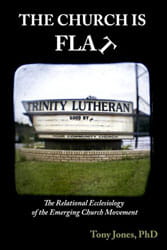 Now Featured in the Patheos Book Club:
Now Featured in the Patheos Book Club:
The Church Is Flat: The Relational Ecclesiology of the Emerging Church Movement
By Tony Jones
Book Excerpt
Chapter 5: The Christological Office of "Friend" and Practices of Public Friendship
In adding the relational title, "friend," to the honorific titles, "prophet, priest, and king," Moltmann proposes that "there is no human hope" for a world free of class struggles and domination without "a classless society free of domination, without repression and without privileges."[i] And that comes only by friendship, characterized by "affection, loyalty, reliability, constancy in disaster, openness, freedom, sympathy, and noncompetitiveness."[ii] Moltmann also issues a corrective to the modern conception of friendship by insisting that the friendship for which he is calling not be private but public: "The friendship of Jesus cannot be lived and its friendliness cannot be disseminated when friendship is limited to people who are like ourselves and when it is narrowed down to private life."[iii]
"Friend" has been a core theological rubric in the emerging church movement since its inception. The leaders of Emergent Village, arguably the most significant organization in the ECM between 2001 and 2008, identify the organization as a "growing, generative friendship among missional Christian leaders."[iv] Supporters and funders of the organization go by the appellation, "Friend of Emergent Village," and the organization distributes iconographic web badges with that phrase that are common in the Christian blogosphere. In my book The New Christians: Dispatches from the Emergent Frontier, I proposed that, "Emergents believe that an envelope of friendship and reconciliation must surround all debates about doctrine and dogma."[v] Moltmann proposed "Friend" as a fifth christological office in 1975; Emergent Village's introduction of that term as the hallmark of their network in 2001 did not rely on Moltmann, but the connection is more than coincidental.
To some extent, the emerging church movement has exemplified the public friendship for which Moltmann advocates in his ecclesiology. The next step in the ECM's process of theological friendship will be to develop practices that explicitly encourage public friendship. One of these will be to engage in inter-religious dialogue, an area with which the ECM has little experience. Other than a meeting in 2005 with the leaders of Synagogue 3000, a Jewish think tank, the movement has done little to pursue public friendship with non-Christians. Some consider the inter-religious dialogues of the twentieth century disappointing in their results, but the ECM's emphasis on practices of public friendship may model an alternative of inter-religious conversation. The ECM has an opportunity to forge a type of inter-religious relation that, like Moltmann's theology, maintains a robust Christian identity while remaining truly open to the life of the other. These practices of public friendship with adherents of other religions-and no religion-should be pursued aggressively.[vi]
The concept of friendship can also be more fully operationalized within the movement itself. As J.L. Austin and other philosophers of language have conclusively shown, words do things.[vii] Thus, the words that are used to describe the adherents to the movement will necessarily shape the self-perception of those adherents and will shape the perception of the movement by those who observe it.
The adoption and use of the language of friendship will aid emerging church congregations in becoming the egalitarian fellowships that they long to be. These congregations have largely abdicated the traditional titles taken by clergy (Reverend, Pastor, Father), titles which sometimes serve to prop up traditional hierarchical structures and the attitudes of domination and submission that so often accompany them. Now, at a time when public distrust of clergy is on the rise due to the many public scandals of the past several decades, clergypersons may do well to relinquish antiquated and honorific titles in favor of a single designator, like "friend," that clearly communicates an equivalency between all members of a faith community. Practices that relocate ecclesial authority in language of trust-like the office of friend-communicate the equivalency of all members of the faith community before God and downplay the traditional power differential between clergy and laypeople.
[i] Moltmann, The Church in the Power of the Spirit: A Contribution to Messianic Ecclesiology, 116.
[ii] Scott and Cavanaugh, The Blackwell Companion to Political Theology, 237.
[iii] Moltmann, The Church in the Power of the Spirit: A Contribution to Messianic Ecclesiology.
[iv] Jones, The New Christians: Dispatches from the Emergent Frontier, xi.
[v] Jones, The New Christians: Dispatches from the Emergent Frontier, 77.
[vi] This is not unique to the emerging church movement. It is the very model being used by Interfaith Youth Core. But the ECM is uniquely poised within American Protestantism to catalyze a similar dialogue.
[vii] Austin, How to Do Things with Word
1/3/2012 5:00:00 AM



